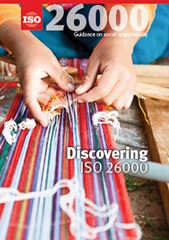Defining standards in CSR
 The ISO 26000 standard defines activities which can constitute CSR and aims to raise the concept’s profile.
The ISO 26000 standard defines activities which can constitute CSR and aims to raise the concept’s profile.
The International Organization for Standardization’s framework on social responsibility (ISO 26000) is designed to help businesses “turn great ideas into effective actions”. It encourages companies to go beyond legal compliance and explains that social responsibility can be integrated into an organisation by regularly reviewing and improving its practices.
ISO 26000 outlines seven “core subjects” which can be counted as CSR-related activities:
1. human rights;
2. labour practices;
3. the environment;
4. fair operating practices;
5. consumer issues;
6. community involvement and development; and
7. organisational governance.
Good governance ensures that the six other factors receive appropriate attention. Once an organisation recognises its social responsibilities, it should identify and build relevant relationships with stakeholders.
The human rights aspect involves due diligence, recognising situations where rights are at risk, avoiding complicity and resolving grievances. The standard draws attention to how human rights cover all spheres of life in society – civil, political, economic, social and cultural.
Responsible labour practices cover employment and employment relationships, working conditions, social security, dialogue with employees, training and development, and health and safety at work.
Environmental issues feature highly in many CSR programmes. The ISO recognises work that protects biodiversity, restores natural habitats, prevents pollution, promotes the sustainable use of resources, and responds to climate change (i.e. mitigation and/or adaptation).
Fair operating practices include action against corruption, responsible political involvement (i.e. lobbying), fair competition, and the promotion of social responsibility in the organisation’s value chain. Respect for property rights is also highlighted.
 Consumers’ health and safety should, first and foremost, be protected. They should also be encouraged to consume products in a sustainable way and should also receive a good quality service, factual and unbiased information, and effective options for resolving complaints and disputes.
Consumers’ health and safety should, first and foremost, be protected. They should also be encouraged to consume products in a sustainable way and should also receive a good quality service, factual and unbiased information, and effective options for resolving complaints and disputes.
Community involvement and development has a broad meaning but can include activities which promote health, education and/or culture, create jobs and wealth, and improve skills and access to technology.
“Operating in a socially responsible manner is no longer an option,” ISO Secretary-General Rob Steele has said. “It is becoming a requirement of society worldwide. What makes ISO 26000 exceptional among the many already existing social responsibility initiatives is that it distils a truly international consensus on what social responsibility means and what core subjects need to be addressed to implement it.”
More information on implementing the standard is available





